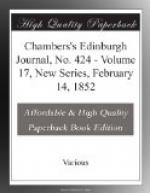‘I should be happy, madam, if I were rich,’ I replied. ’Suffering now from the strain of poverty, it is no marvel if I place an undue value on plenty.’
‘Yet see what it does for me!’ continued my companion. ’Does it give me back my husband, my brave boys, my beautiful girl? Does it give rest to this weary heart, or relief to this aching head? Does it soothe my mind or heal my body? No! It but oppresses me, like a heavy robe thrown round weakened limbs: it is even an additional misfortune, for if I were poor, I should be obliged to think of other things beside myself and my woes; sand the very mental exertion necessary to sustain my position would lighten my miseries. I have seen my daughter wasting year by year and day by day, under the warm sky of the south—under the warm care of love! Neither climate nor affection could save her: every effort was made—the best advice procured—the latest panacea adopted; but to no effect. Her life was prolonged, certainly; but this simply means, that she was three years in dying, instead of three months. She was a gloriously lovely creature, like a fair young saint for beauty and purity—quite an ideal thing, with her golden hair and large blue eyes! She was my only girl—my youngest, my darling, my best treasure! My first real sorrow—now fifteen years ago—was when I saw her laid, on her twenty-first birthday, in the English burial-ground at Madeira. It is on the gravestone, that she died of consumption: would that it had been added—and her mother of grief! From the day of her death, my happiness left me!’
Here the poor lady paused, and buried her face in her hands. The first sorrow was evidently also the keenest; and I felt my own eyelids moist as I watched this outpouring of the mother’s anguish. After all, here was grief beyond the power of wealth to assuage: here was sorrow deeper than any mere worldly disappointment.
‘I had two sons,’ she went on to say after a short time—’only two. They were fine young men, gifted and handsome. In fact, all my children were allowed to be very models of beauty. One entered the army, the other the navy. The eldest went with his regiment to the Cape, where he married a woman of low family—an infamous creature of no blood; though she was decently conducted




